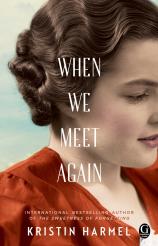Reading Group Guide
Discussion Questions
When We Meet Again

Introduction
When a mysterious painting arrives out of the blue at Emily Emerson’s door, all the heartache and uncertainties in her life bubble to the surface: she is out of work, her mother and grandmother are dead, she isn’t speaking to her father, she abandoned the love of her life and she gave up her only child for adoption. The painting, which depicts a familiar-looking young woman in a field under a violet sky, stirs a desire in Emily to reconnect with her long-estranged father in an effort to find the grandfather she never knew. Emily and her father travel from Florida to Germany to Georgia and back again, and along the way uncover a family history both beautiful and tragic. In the end, Emily learns about the healing power of art, forgiveness and love.
Topics & Questions for Discussion
1. Our first encounter with Emily Emerson involves her lying in bed on a Friday morning, discouraged and alone. The scene is broken by a telephone call from her former editor, letting her know a package arrived for her --- a package we later learn is the painting of Grandma Margaret. How did you initially characterize Emily? Did you feel sorry for her? Is she a likeable character? Without the arrival of the painting, do you think she would have snapped out of her depression? Why or why not?
2. Very early in the novel, the topic of abandonment arises. Emily’s grandfather abandoned her grandmother and father; her father abandoned her; she abandoned Nick and her daughter, Catherine. Discuss this abandonment motif, considering how each of the characters reacts in the wake of being left behind. Does the title --- WHEN WE MEET AGAIN --- hint at reconciliation? Do you think all of the characters find reconciliation in the end? Why or why not?
3. Discuss the structure of the narrative. How does the weaving between the past and present-day story lines affect your understanding of the characters? Do you think this “time travel” allows the story to belong to both Emily and her grandparents? How would the story change if we only had Emily’s point of view?
4. On page 33, Jeremiah tells Emily, “sometimes, when one is living with a broken heart, it’s too hard to give voice to the stories that hurt the most.” Consider the ways in which silence shapes the lives of these characters. Is what is not said a defining aspect of life for Emily, her father, her grandparents, etc.?
5. “Do you really think one bad experience has the power to change a person’s character…?” Myra asks Emily, and she replies that yes, “if you love someone enough and they hurt you deeply, it can change you forever” (pages 70–71). Answer Myra’s question for yourself. Did Grandma Margaret change as a result of her love affair with Peter? Did Peter? In what ways?
6. How is Margaret a symbol of American ideals --- specifically life, liberty, and the pursuit of happiness? In what ways is she the antithesis of these principles? Consider her relationship with her family, Jeremiah, Peter and Emily in your response.
7. Evaluate Franz Dahler’s character. Do you blame him for allowing Peter to leave his family, his home and his country? Do you think he could have changed the course of Peter’s life if he had stood up to their father? Is he similar to many of the other characters in that he can “never forget that which you regret” (page 166)?
8. What role does World War II play in the novel? Do all of the characters’ suffering and joy happen as a result of the war?
9. On page 184, Peter declares, “From this moment forward, I am no longer a Dahler.” Consider the ways in which troubled parent/child relationships are the sparks that cause the characters to change their lives and their identities --- in some cases very literally. Discuss in relation to the moment when Victor tells Emily, “That’s what being a parent is: loving someone so much that they’ll be a part of you forever, no matter what” (page 190).
10. Revisit the scene, beginning on page 306, when Emily goes to her mother’s grave. Do you think she finds the closure she is seeking? In the end, does Emily “find [her] way back to who [she] used to be” (page 307)?
11. A possible theme for the novel emerges on page 329 when Louise asks Peter, “You ain’t gonna hold a grudge, are you?” Which character seeks forgiveness most? You might consider Emily, Victor, Peter, Louise, Franz, Margaret or Ingrid in your response.
12. Were you surprised when Nick arrived at Emily’s doorstep? Do you think Nick and Emily are fulfilling the love story that Peter and Margaret never got to have?
13. Utimately, do you think the painting is responsible for changing Emily’s life? Reflect on the changes in her relationship with her father, Nick, Catherine and herself. Do you think art has the power to transform the way we understand the world? Why or why not?
When We Meet Again
- Publication Date: June 7, 2016
- Genres: Fiction
- Paperback: 384 pages
- Publisher: Gallery Books
- ISBN-10: 1476754160
- ISBN-13: 9781476754161








